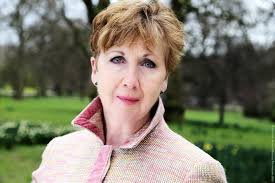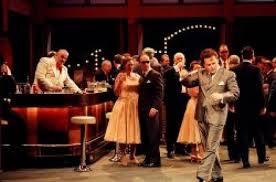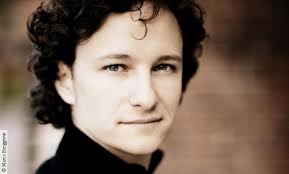THE COMPLETE PSALMS OF DAVID SERIES 2 VOLUME 10
CHICHESTER CATHEDRAL CHOIR, CHARLES HARRISON, director,TIMOTHY RAVALDE, organ
PRIORY PRCD1155 (74.12)
The second complete series of 150 psalms concludes with this offering from Chichester. As in previous volumes there is much variety and interest in the sequence of chants and all is presented with conviction and attention to detail. Each CD can be enjoyed in its own right but as a collection they are a wonderful resource for entertaining listening or private devotion as well as being a wonderful record of the current state of cathedral music.
SIR CHARLES VILLIERS STANFORD – THE COMPLETE ORGAN WORKS 3
DANIEL COOK, organ of SALISBURY CATHEDRAL
PRIORY PRCD 1146 (71’14)
This volume continues the survey of Stanford’s organ music with this excellent programme by Daniel Cook. Included are Sonata No 4in C minor, Canzona, Three Preludes & Fugues & Six Preludes & Postludes Set 2 as well as an arrangement of a short piece originally for piano & violin.
GREAT EUROPEAN ORGANS No. 99
DAVID LEIGH, organ of ST PATRICK’S CATHEDRAL, DUBLIN
PRIORY PRCD 1168
GREAT EUROPEAN ORGANS No. 100
DAVID POULTER, organ of LIVERPOOL (ANGLICAN) CATHEDRAL
PRIORY PRCD 1158
With these two releases another long-running series from Priory comes to an end. The GREAT EUROPEAN ORGANS series has been a mammoth undertaking, showcasing the very best of organs and organists and an immensely diverse repertoire of familiar and unfamiliar music.
The St Patrick’s CD presents some wonderful music spanning the late 19th and twentieth centuries. Larger works here include Concert Fantasia in D minor by Sir Robert Prescott Stewart and Lemare’s Organ Symphony No 1 in G minor.
The final CD, from Liverpool, presents a programme of mostly familiar music well suited to this grandest of organs and cathedrals. Beginning with Elgar’s Sonata in G and ending with Walton’s Orb & Sceptre the programme also features further music by Walton, Bridge, Howells, Rawsthorne & a transcription of Whitlock’s brilliant Elgar-pastiche, Dignity & Impudence. This series will be missed but it leaves behind a treasure trove of fine recordings which will hopefully continue to be available for many years to come.
TALLIS – LAMENTATIONS
THE CARDINALL’S MUSICK, directed by ANDREW CARWOOD
HYPERION CDA68121 (73’09)
Two settings of Lamentations of Jeremiah form the core of this all-Tallis recording by The Cardinall’s Musick. Alongside these can be found items from the Short ‘Dorian’ Service, psalms and a Te Deum. The Fitzalan Chapel of Arundel Castle seems a fitting place for singing and recording this music. The programme highlights the variety of composing styles employed, from the polyphony of the expansive choral settings to simpler homophonic forms.
CONDUCTUS 3 – Music & Poetry from 13th Century France
JOHN POTTER, CHRISTOPHER O’GORMAN & ROGERS COVEY-CRUMP
HYPERION CDA68115 (61’35)
The Conductus form sits alongside Organum and early motets but is less well explored by musicians today. This third compilation comes from experts in the field, recorded at the National Centre for Early Music in York. The performers breathe life into this ancient music, creating a compelling performance.
HOWELLS – Collegium Regale
CHOIR OF TRINITY COLLEGE, CAMBRIDGE, director STEPHEN LAYTON, organ ELEANOR KORNAS & OWAIN PARK
HYPERION CDA68105 (61’14)
A beautiful recording of a selection of Howells’ church music- Holy Communion, morning and evening canticles, anthems and and a solo organ piece, the Rhapsody No 1 in D flat major. This music never fails to move me.
SONGS OF LOVE, WAR & MELANCHOLY – The operatic fantasias of JEAN-FRANCOIS GALLAY
ANNEKE SCOTT, natural horn, STEVEN DEVINE, piano, LUCY CROWE, soprano
RESONUS RES10153 (66’41)
This is the final volume of three by Anneke Scott of music by Jean-Francois Gallay, himself a natural horn player. There is great vitality in these performances of music which was all new to me.
THE SOLDIER’S RETURN – Guitar works inspired by Scotland
JAMES AKERS, romantic guitar
RESONUS RES10165 (61’00)
Resonus is to be congratulated on its ability to produce fine recordings of interesting and unusual repertoire. This CD features music inspired by Scotland from a number of guitarist/composers, many of the 19th Century, from continental Europe. It is a beautiful CD.
CONVERSED MONOLOGUE – Concerti by JG GRAUN, J-M LECLAIR & WF BACH
FANTASTICUS XL
RESONUS RES10166 (70’08)
An interesting assemblage of 18th Century instrumental music written for courtly patrons. Using authentic instruments this ensemble transport the listener to a different age and culture in committed performances of these three concerti.
HER HEAVENLY HARMONY – Profane music from the royal court
THE QUEEN’S SIX
RESONUS RES10164 (62’19)
Further courtly music, this time vocal music from the reign of Elizabeth I. This is the second album from this choir devoted to music by familiar names of the Tudor and Jacobean royal courts. Morley, Tomkins, Tallis, Byrd, Gibbons & Weelkes are all represented by secular songs of love, death and other themes. A lovely collection.
BRITISH VIOLIN SONATAS VOL 2
TASMIN LITTLE, violin, PIERS LANE, piano
CHANDOS CHAN10899 (66’05)
This 2nd Volume collects violin music by influential British composers who span the 19th/20th centuries. Sonatas by Bridge, Bliss & Ireland sit alongside Vaughan Williams’ Two Pieces and a very late piece by William Lloyd Webber, The Gardens at Eastwell. A fine programme.
DOMENICO SCARLATTI – 18 KEYBOARD SONATAS
YEVGENY SUBDIN, piano
BIS RECORDS BIS-2138 SACD (74’30)
This collection of keyboard sonatas is very enjoyable. Whilst opinions differ about the piano being a suitable vehicle for this repertoire it is without doubt that Yevgeny Subdin’s expressive playing brings life and feeling to this music.
J S BACH – SECULAR CANTATAS Vol 6 (TRAUERODE)
BACH COLLEGIUM JAPAN chorus & orchestra, MASAAKI SUZUKI, director
BIS RECORDS BIS-2181 SACD (78’55)
This volume presents performances of the Trauerode, Lass, Furstin, Lass noch einen Strahl,Schlage doch, Gewunschte Stunde (a work thought now to be possibly composed by Georg M Hoffmann) and Tilge, Hochster, meine Sunden (after Pergolesi’s Stabat Mater). A further substantial offering from the Collegium and soloists.
SP





